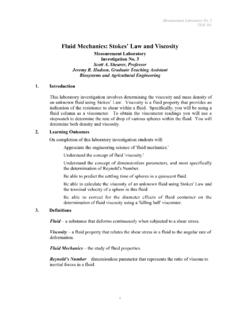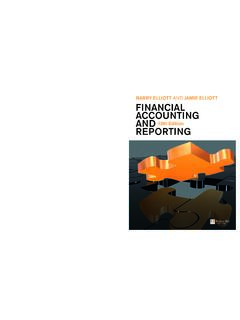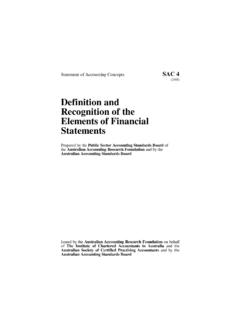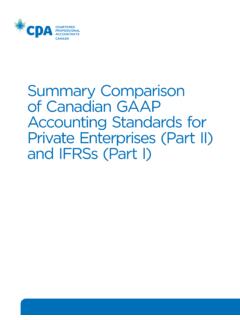Transcription of Unit 1 Introduction to Financial Accounting
1 Accounting for Managers 1 Unit 1 Introduction to Financial Accounting Learning Outcome After reading this unit, you will be able to: Explain succinctly Financial Accounting concepts Elucidate on different principles of Financial Accounting Explicate the importance and scope of Financial Accounting Understand Generally Accepted Accounting Principles(GAAP) Identify limitations of Financial Accounting Time Required to Complete the unit 1. 1st Reading: It will need 3 Hrs for reading a unit 2. 2nd Reading with understanding: It will need 4 Hrs for reading and understanding a unit 3. Self Assessment: It will need 3 Hrs for reading and understanding a unit 4. Assignment: It will need 2 Hrs for completing an assignment 5.
2 Revision and Further Reading: It is a continuous process Content Map Introduction Role of Financial Accounting Principles of Financial Accounting Importance of Financial Accounting Benefits of Financial Accounting Limitations of Financial Accounting 2 Accounting for Managers Accounting Principles Accounting Concepts and Conventions Accounting standards in India and International Accounting standards summary Self-Assessment Test Further Reading Accounting for Managers 3 Introduction Financial accountancy (or Financial Accounting ) is the field of accountancy concerned with the preparation of Financial statements for decision makers, such as stockholders, suppliers, banks, employees, government agencies, owners and other stakeholders.
3 Financial capital maintenance can be measured in either nominal monetary units or units of constant purchasing power. The central need for Financial Accounting is to reduce the various principal-agent problems, by measuring and monitoring the agents' performance and thereafter reporting the results to interested users. Financial accountancy is used to prepare accountancy data for people outside the organisation or for those, who are not involved in the mundane administration of the company. Management Accounting , provides Accounting information to help managers make decisions to manage and enhance the business. In short, Financial Accounting is the process of summarising Financial data, which is taken from an organisation's Accounting records and publishing it in the form of annual or quarterly reports, for the benefit of people outside the organisation.
4 Financial accountancy is governed not only by local standards but also by international Accounting standard. Role of Financial Accounting Financial Accounting generates some key documents, which includes profit and loss account, patterning the method of business traded for a specific period and the balance sheet that provides a statement, showing mode of trade in business for a specific period. It records Financial transactions showing both the inflows and outflows of money from sales, wages etc. Financial Accounting empowers the managers and aids them in managing more efficiently by preparing standard Financial information, which includes monthly management report tracing the costs and profits against budgets, sales and investigations of the cost.
5 Study Notes 4 Accounting for Managers Assessment 1. Define " Financial Accounting ". 2. Write in short difference between Financial Accounting and Management Accounting . Discussion 1. Discuss the role of Financial Accounting . Principles of Financial Accounting Financial Accounting is based on several principles known as Generally Accepted Accounting Principles (GAAP) (Williamson 2007). These include the business entity principle, the objectivity principle, the cost principle and the going-concern principle. Business entity principle: Every business requires to be accounted for separately by the proprietor. Personal and business-related dealings should not be mixed. Objectivity principle: The information contained in Financial statements should be treated objectively and not shadowed by personal opinion.
6 Cost principle: The information contained in Financial statements requires it to be based on costs incurred in business transactions. Going-concern principle: The business will continue operating and will not close but will realise assets and discharge liabilities in the normal course of operations Accounting for Managers 5 Study Notes Assessment 1. Write notes on: Objectivity principle. Cost principle. Discussion 1. Discuss the Generally Accepted Accounting Principles (GAAP) Importance of Financial Accounting It provides legal information to stakeholders such as Financial accounts in the form of trading, profit and loss account and balance sheet. It shows the mode of investment for shareholders.
7 It provides business trade credit for suppliers. It notifies the risks of loan in business for banks and lenders. 6 Accounting for Managers Study Notes Assessment 1. Explain the need of Financial Accounting . Discussion 1. Discuss the importance of Financial information to the parties having interest in business unit. Benefits of Financial Accounting Maintaining systematic records: It is a primary function of Accounting to keep a proper and chronological record of transactions and events, which provides a base for further processing and proof for checking and verification purposes. It embraces writing in the original/subsidiary books of entry, posting to ledger, preparation of trial balance and final accounts.
8 Meeting legal requirements: Accounting helps to comply with the various legal requirements. It is mandatory for joint stock companies to prepare and present their Accounting for Managers 7 accounts in a prescribed form. Various returns such as income tax, sales tax are prepared with the help of the Financial accounts. Protecting and safeguarding business assets: Records serve a dual purpose as evidence in the event of any dispute regarding ownership title of any property or assets of the business. It also helps prevent unwarranted and unjustified use. This function is of paramount importance, for it makes the best use of available resources. Facilitates rational decision-making: Accounting is the key to success for any decision-making process.
9 Managerial decisions based on facts and figures take the organisation to heights of success. An effective price policy, satisfied wage structure, collective bargaining decisions, competing with rivals, advertisement and sales promotion policy etc all owe it to well set Accounting structure. Accounting provides the necessary database on which a range of alternatives can be considered to make managerial decision-making process a rational one. Communicating and reporting: The individual events and transactions recorded and processed are given a concrete form to convey information to others. This economic information derived from Financial statements and various reports is intended to be used by different groups who are directly or indirectly involved or associated with the business enterprise.
10 Study Notes 8 Accounting for Managers Assessment 1. State the advantages of Financial Accounting . Discussion 1. Discuss how Financial Accounting is beneficial in Decision-Making Process. Limitations of Financial Accounting One of the major limitations of Financial Accounting is that it does not take into account the non-monetary facts of the business like the competition in the market, change in the value for money etc. The following limitations of Financial Accounting have led to the development of cost Accounting : 1. No clear idea of operating efficiency: You will agree that, at times, profits may be more or less, not because of efficiency or inefficiency but because of inflation or trade depression.








